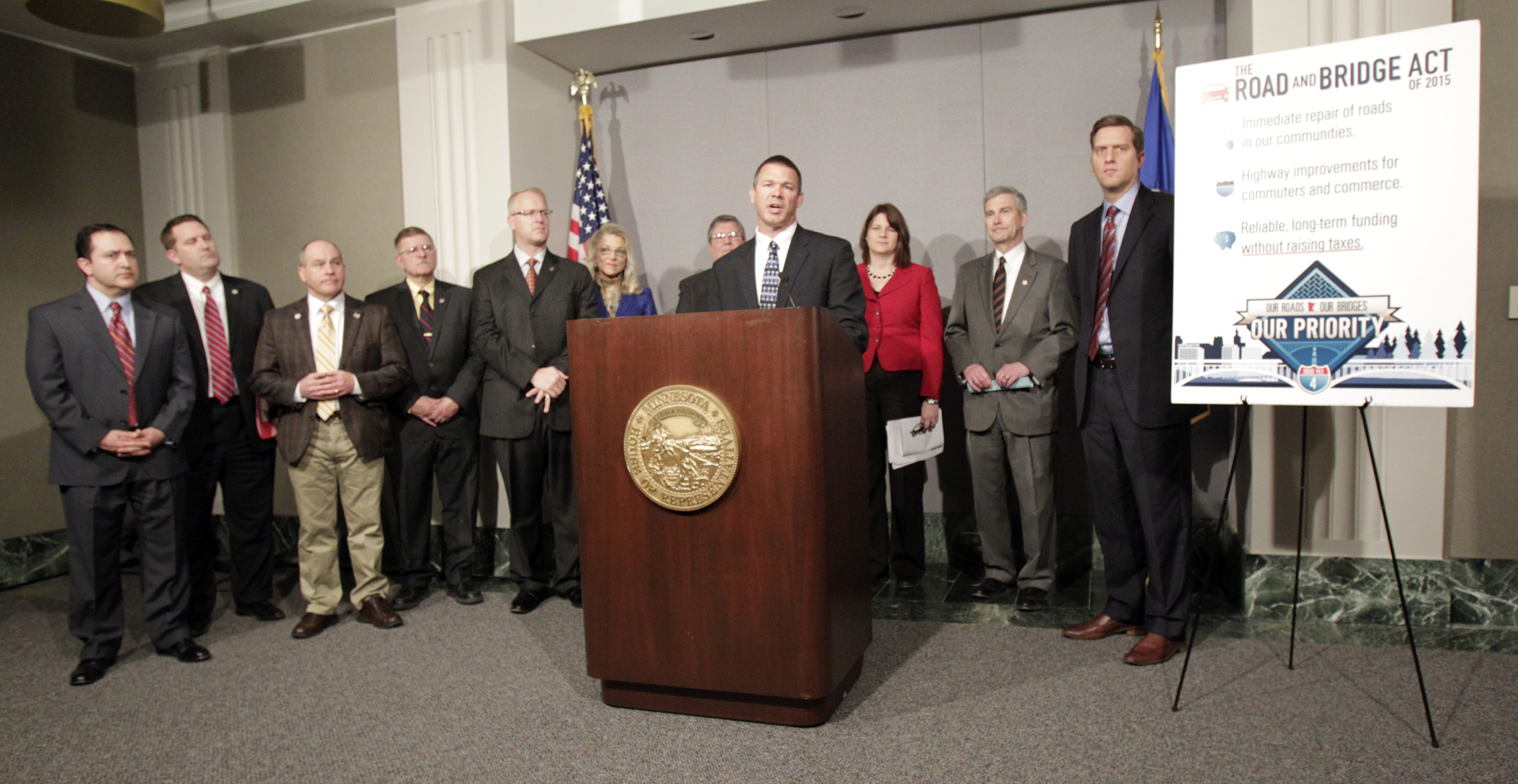No gas tax hike in $7 billion Republican roads and bridges plan

(Updated 2:30 p.m. with video)
Republicans on Monday released a 10-year transportation funding package that would invest $7 billion in repairing Minnesota’s roads and bridges without raising the state’s gas tax.
It is a plan that sets the stage for difficult negotiations to hammer out a comprehensive funding plan for the state’s transportation infrastructure that the Department of Transportation has estimated is in need of roughly $6 billion in fixes.
Gov. Mark Dayton and Senate Democrats have both put forward plans that would create a new wholesale fuel tax on top of the state’s existing gas tax to help fund repairs.
“I’m proud to say we’ll do that without raising the gas tax,” said House Speaker Kurt Daudt (R-Crown).
Announced at a morning news conference, the Republican plan would redirect existing state revenues from taxes on motor vehicle leases, rentals and parts to fund a $300 million increase in annual transportation spending, creating what they dubbed a “Transportation Stability Fund.”
It also proposes to borrow more than $2 billion for road and bridge work, raise $1.2 billion by “realigning Department of Transportation resources,” and use $228 million of the state’s projected budget surplus.
“This is a future-oriented approach that says, ‘we do have stability,’” said Rep. Tim Kelly (R-Red Wing), chair of the House Transportation Policy and Finance Committee. He called the gas tax an “antiquated” concept.
House DFLers were quick to criticize the plan, dismissing it in a news release as shortsighted and accusing Republicans of siphoning General Fund dollars from other priorities.
“The Republican plan irresponsibly raids the general fund, shifting hundreds of millions of tax dollars that should pay for better schools and uses it to pay for transportation projects,” House Minority Leader Paul Thissen (DFL-Mpls) said in a written statement.
Focus on roads and bridges
The Republican plan would place the state’s priority squarely on roads and bridges, raising $4 billion for state roads, $1.4 billion for county roads, $580 million for city roads and $282 million for the state’s smallest cities. It would dedicate no new funding for transit projects, however, committing $16 million annually to pay for metro area transit capital improvements.
By comparison, Dayton’s transportation proposal would raise an additional $280 million per year for transit; the Senate plan, put forward by Sen. D. Scott Dibble (DFL-Mpls), would raise roughly $250 million per year. Both plans would do so by increasing a metro-area transit-dedicated sales tax.
“We’re focusing on the road and bridge infrastructure because that’s what we believe the vast majority of Minnesotans want,” Daudt said. The Metropolitan Council would be left to fund its long-term transit plan on its own under the proposal.
Daudt said he expects the proposal to be on the House Floor for a vote by the end of April.
Rep. Frank Hornstein (DFL-Mpls), the minority lead on the transportation committee, said in separate written statement that the plan released Monday relies on “shifts and gimmicks.”
“Smoke and mirrors budgeting will not solve our transportation funding crisis,” Hornstein said. “Instead, we need a solution that makes long-term, dependable investments in our transportation system without racking up new debt or threatening our kids’ future.”
Related Articles
Search Session Daily
Advanced Search OptionsPriority Dailies
Ways and Means Committee OKs proposed $512 million supplemental budget on party-line vote
By Mike Cook Meeting more needs or fiscal irresponsibility is one way to sum up the differences among the two parties on a supplemental spending package a year after a $72 billion state budg...
Meeting more needs or fiscal irresponsibility is one way to sum up the differences among the two parties on a supplemental spending package a year after a $72 billion state budg...
Minnesota’s projected budget surplus balloons to $3.7 billion, but fiscal pressure still looms
By Rob Hubbard Just as Minnesota has experienced a warmer winter than usual, so has the state’s budget outlook warmed over the past few months.
On Thursday, Minnesota Management and Budget...
Just as Minnesota has experienced a warmer winter than usual, so has the state’s budget outlook warmed over the past few months.
On Thursday, Minnesota Management and Budget...